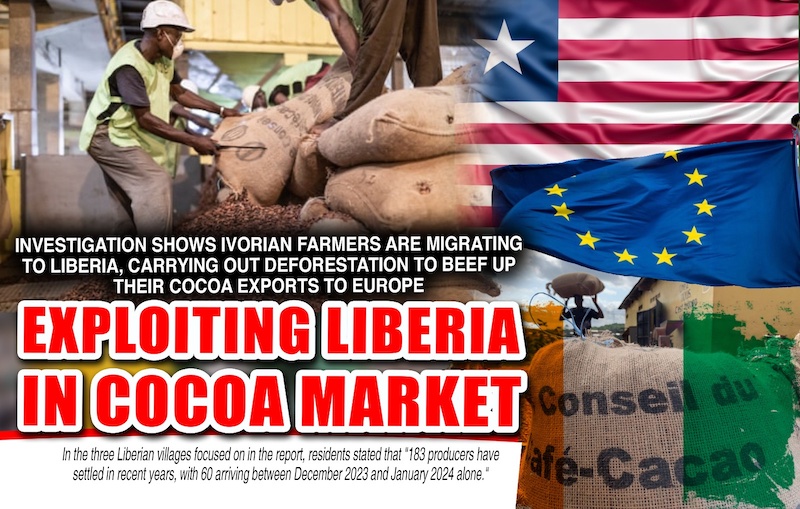
Brussels — During an event held in Brussels in April, an investigation unveiled that companies procuring cocoa from Côte d’Ivoire are contributing to the deforestation of forests in neighboring Liberia.
The findings of the on-site investigation, presented by Bakary Traoré, a representative of IDEF, highlight that the traceability mechanisms employed by these companies are flawed and do not comply with the new anti-deforestation regulation published on June 9, 2023, in the Official Journal of the European Union. The investigators argued that these mechanisms should be replaced by the robust and transparent national traceability system already in place in Côte d’Ivoire.
“Currently, efforts are underway in Côte d’Ivoire to establish a national traceability system. Under this system, all land plots in Côte d’Ivoire will be geolocated, and producers will be registered. A map of producers, including a barcode system, will indicate what individual farms are capable of producing and track their sales. Our investigation underscores the urgency of accelerating the efforts initiated by the Ivorian authorities,” explained Bakary Traoré, Executive Director of the Ivorian NGO (IDEF) and the primary author of the report.
“The existing traceability systems were established by the chocolate companies and are controlled by them. They lack transparency, and our investigation revealed significant flaws. To address this issue and comply with the new European regulations, raw material traders will need to revise their approach.”
The demand for cocoa beans is skyrocketing globally. However, before these beans can be transformed into the chocolates enjoyed by billions of consumers, they must navigate a complex market involving various intermediaries between small, underpaid cocoa farmers and retailers.
This sector has long been opaque, with one major consequence: thousands of hectares of forest have been cleared to make way for cocoa plantations.
Now, the EU has taken a decisive step by adopting the European Union Deforestation Regulation (EUDR) in June 2023 for products linked to deforestation and forest degradation. As of December 2024, it will be illegal to import and market cocoa beans harvested after 2020 on plots of land deforested to create plantations.
This regulation presents a unique opportunity to address the historical problem of deforestation in the cocoa sector, which the industry and certification systems have been unable to resolve voluntarily.
Côte d’Ivoire is the world’s largest producer of cocoa (source: FAO), with 75 percent of its production absorbed by Europe, its single largest consumer, including 90 percent of France’s imports and 70 percent of Germany’s.
However, for years, cocoa plantations have been expanding at the expense of forests, significantly contributing to their destruction.
As land becomes less productive, farmers clear more forested areas, replanting them with cocoa trees. The numbers speak for themselves: with 16 million hectares at the beginning of the 20th century (source: REDD+), by 1986, Côte d’Ivoire’s forests had shrunk to 7.85 million hectares. By 2020, when the government implemented restrictions, only 2.9 million hectares remained.
As the investigation reveals, this situation is driving Ivorian farmers to migrate to the fertile lands of neighboring Liberia, which is home to more than half of West Africa’s remaining tropical forests.
In the three Liberian villages focused on in the report, residents stated that “183 producers have settled in recent years, with 60 arriving between December 2023 and January 2024 alone.”
Not only is new deforestation occurring, but Liberia also lacks the infrastructure for farmers to export their beans. Consequently, once harvested, the cocoa beans are carried back to Côte d’Ivoire on people’s backs.
The investigators found that Liberian beans were easily mixed with local produce, indiscriminately filling bags intended for ordinary sale as well as those destined for export and certified accordingly. This undermines a system intended to prevent fraud and the importation of beans from other countries.
Therefore, the traceability system established by the Ivorian government is indispensable. By mapping all production plots and having a complete overview of their utilization, the national system should prevent fraud. Currently, due to the use of multiple systems, a single plot can repeatedly be designated as a production source, effectively ‘laundering’ cocoa beans produced through deforestation in Liberia.
The investigators also urged the EU to implement robust controls as part of the due diligence required by EUDR to help mitigate this issue.
“The cocoa industry has pledged to end deforestation, but our investigation shows that this is still not happening. The EU’s deforestation regulation represents a historic opportunity to finally honor this commitment,” said Bakary Traoré. “The best way to achieve this is by implementing a national traceability system covering the entire sector, rather than relying on a piecemeal approach by individual companies. We call on traders, certifiers, and major chocolate companies to engage in the discussion and commit to a national traceability system in Côte d’Ivoire.”
“Many companies claim to be working to improve cocoa sustainability, but our investigation shows that the reality on the ground is very different from the image projected by large PR campaigns targeting European consumers,” Traoré added. “In fact, the major companies are afraid of losing their competitive edge and their access to cheap cocoa. They are benefiting greatly from the inefficient system that has been used so far, which only perpetuates poverty for millions of producers. This cannot continue.”
Source: Frontpage Africa















